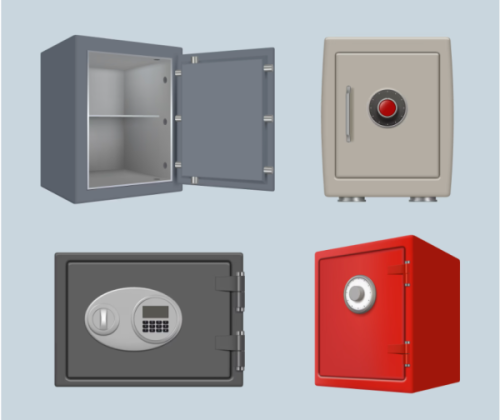
What Should I Keep (and Not Keep) in My Home Safe?
A home safe is like a kitchen knife: Nicey and slicey when used precisely, but dicey and pricy if you are too feisty. While bank safe deposit boxes require you to visit your bank during operating hours (and Court oversight to open after you have died), a safe at home allows you access to your belongings and information at all hours with no bank manager looking over your shoulder, and no monthly fee. On the flip side, burglary or a party absconding with your safe’s contents may be a concern. So here is a list of suggestions you should consider before you fill your safe.
What to Keep in Your Home Safe
- CASH: Have enough “run money” on hand without being a target for a Hans Gruber wannabee. A single person should have no more than $25,000 in a safe, while a couple or family can flirt with closer to $35,000. Make sure to keep a decent amount of this cash in $5, $10 and $20 bills, since $100’s are not always easily exchangeable for lower bills. Reasoning: There are plenty of desperate people out there, but a tradeoff of $35,000 vs. 15 years in the county slammer for burglary is not a great gamble, even for stupid criminals (and if this does happen you may be able to rebuild this sum within a few years).
- JEWELRY & PRECIOUS METALS: The fancy bling and your gold or silver bars should obviously be kept secure. If you have accumulated too many valuable charms you may consider gifting or selling the jewelry you do not use. Reasoning: Too much jewelry makes you a target for thieves. Also, historical asset allocation models suggest having more than 5% of your net worth in precious metals is not an ideally balanced portfolio.
- IDENTIFICATION: You want to keep your driver’s license and Medicare card on your person, but documents such as your passport, Social Security card and original birth certificates should remain in your safe. Reasoning: While you need the initial two documents on a day-to-day basis, passports, Social Security cards and birth certificates tend to only be needed in rare instances.
- PRINTED PASSWORDS: In the Digital Age, the threat of someone learning your passwords is going to be from hacking into your computer. So, feel free to keep a written list of your most recent passwords in your safe. Make sure to update all passwords at least annually, or whenever you have a security breach. Reasoning: Not everyone is adept at updating their passwords on their mobile devices or computers, and many people do not enable dual-factor authentication. Almost all stolen passwords over the last 10 years have been retrieved online, not from written lists.
What NOT to Keep in Your Home Safe
- LEGAL DOCUMENTS: Your original Will, Power of Attorney and Health Care Proxy should be in a place where a trusted Agent can access them easily. Keep these documents clearly labeled in a file cabinet or office drawer. Reasoning: Good luck having your child or friend who does not know your safe code getting legal access to open your safe when you are incapacitated or deceased. Legal documents often need to be accessed NOW, so any delay caused by needing to “crack” your safe only hurts you and your loved ones.
- FIREARMS / AMMUNITION: I am neither a qualified source to opine on proper storage for firearms and ammunition, nor as dumb as this entry may suggest I am (seriously, I am not telling people to not secure their guns). While guns do need to be stored safely, it makes sense to have a separate safe for firearms from the rest of your belongings with a different access code. Reasoning: Non-qualified individuals getting possession of a potentially lethal weapon is not ideal if their accidents or misdeeds are traced back to you. When you die your New York estate is required to inventory your firearms, so having a separate safe for firearms can allow you to narrow your choice of trustworthy individuals to manage this potential liability.
Final Comments for a Home Safe
- Your situation may differ: If your home has an alarm or your apartment building has a doorman and cameras, some of the aforementioned burglary issues can be mitigated, and you can keep more property in the safe than outlined above.
- Comfort first: Keep your safe elevated above floor level so you do not have to get on your hands and knees to access it when you are 80+ years old.
- Confound knuckleheads: Bolt your safe down so someone does not try to run off with it and throw out their back in the process.
- Bigger is better: Order a safe a bit larger than you think you need, and try to have at least 1 – 2 removable shelves.
- Be discreet: Keep your safe in a closet or a location where it won’t attract conversation when you invite guests to your next Ouija Board seance.
- Share access wisely: Choose at least one trusted party to share your safe access code; many safes can have multiple access codes, so you keep one code for yourself and your trusted third party can have an alternate opening code.










